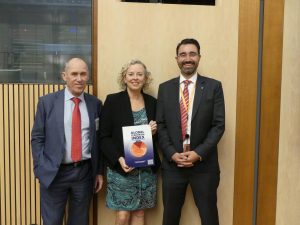
A UNAA event at Parliament House in Canberra last week delved into the complex world of terrorism, its motivating factors and its cost to the global community. The Founder and Executive Chair of the Institute for Economics and Peace, Steve Killelea, addressed the event chaired by the convenors of the UN-Australia parliamentary group, Nationals Party Senator Barry O’Sullivan and Labor MP Sharon Claydon, on Wednesday, 15 February.
Mr. Killelea delivered the findings from the institute’s latest report, Global Terrorism Index 2016. Mr. Killelea said the fourth edition of the index had found there had a been a six per cent decrease in the Global Terrorism Index that takes into account the type of incidents, injuries, deaths as well as property damage from terror attacks. He said that while this appeared encouraging, 2015 was the second worst year on record for terrorism deaths with more 29,000 people losing their lives. He said there had been an increase of 650 per cent of attacks in OECD countries from 77 in 2014 to 577 in 2016, mainly in France and Turkey. The institute’s founder said terrorist attacks in 2015 cost the global economy nearly $US90b. He said the countries that continue to have the highest number of attacks are “pretty sticky” and include Iraq, Afghanistan, and Nigeria. He said ISIL was responsible for half of the deaths caused by terrorism and predicted the Taliban “was the sleeper in the room”. He forecast the Taliban would “overtake ISIL and Boko Haram next year and probably be the biggest terrorism group in the world”. He said that more than 90 per cent of attacks occur in countries where there is already conflict and that Australia “had low levels of terrorism by global standards”.
Mr. Killelea said counter-terrorism operations in Australia were working well and the borders were relatively secure from the threat posed by terrorism, including the return of foreign fighters. He called on the nation’s Federal Parliamentarians to spend more time debating the balance between human rights and the laws of the land. The institute’s Executive chair said the best way to tackle the root cause of terrorism was to provide aid to countries most at risk and invest in preventative measures before radicalism takes hold.